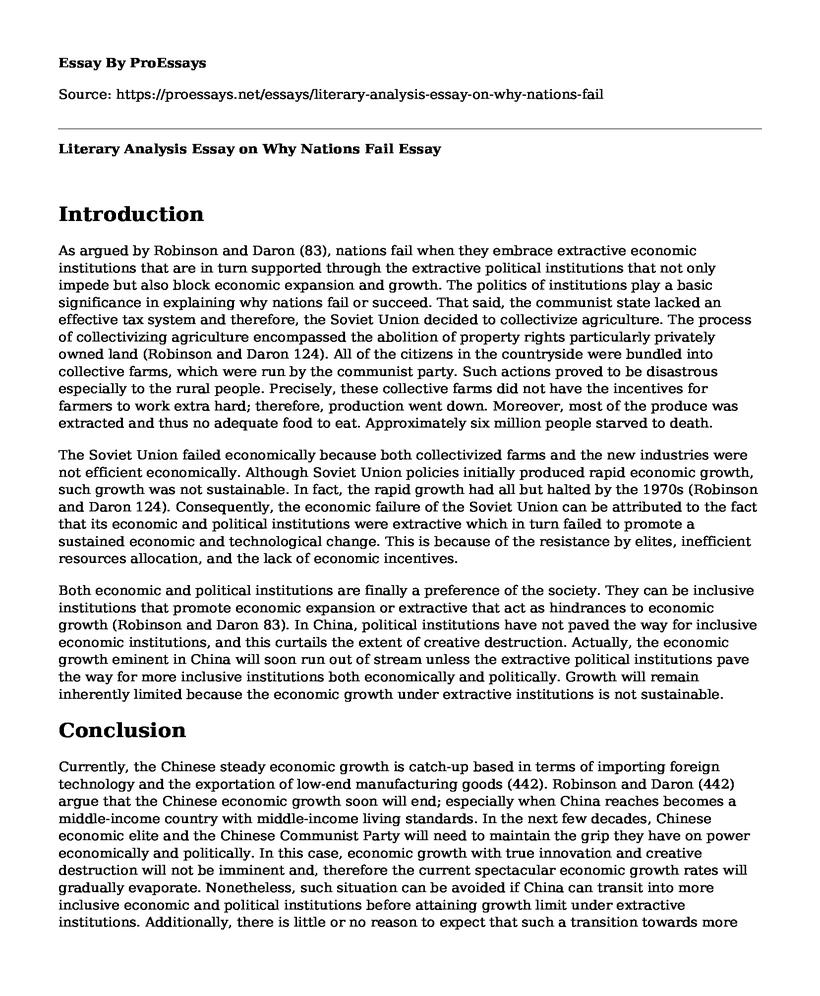Introduction
As argued by Robinson and Daron (83), nations fail when they embrace extractive economic institutions that are in turn supported through the extractive political institutions that not only impede but also block economic expansion and growth. The politics of institutions play a basic significance in explaining why nations fail or succeed. That said, the communist state lacked an effective tax system and therefore, the Soviet Union decided to collectivize agriculture. The process of collectivizing agriculture encompassed the abolition of property rights particularly privately owned land (Robinson and Daron 124). All of the citizens in the countryside were bundled into collective farms, which were run by the communist party. Such actions proved to be disastrous especially to the rural people. Precisely, these collective farms did not have the incentives for farmers to work extra hard; therefore, production went down. Moreover, most of the produce was extracted and thus no adequate food to eat. Approximately six million people starved to death.
The Soviet Union failed economically because both collectivized farms and the new industries were not efficient economically. Although Soviet Union policies initially produced rapid economic growth, such growth was not sustainable. In fact, the rapid growth had all but halted by the 1970s (Robinson and Daron 124). Consequently, the economic failure of the Soviet Union can be attributed to the fact that its economic and political institutions were extractive which in turn failed to promote a sustained economic and technological change. This is because of the resistance by elites, inefficient resources allocation, and the lack of economic incentives.
Both economic and political institutions are finally a preference of the society. They can be inclusive institutions that promote economic expansion or extractive that act as hindrances to economic growth (Robinson and Daron 83). In China, political institutions have not paved the way for inclusive economic institutions, and this curtails the extent of creative destruction. Actually, the economic growth eminent in China will soon run out of stream unless the extractive political institutions pave the way for more inclusive institutions both economically and politically. Growth will remain inherently limited because the economic growth under extractive institutions is not sustainable.
Conclusion
Currently, the Chinese steady economic growth is catch-up based in terms of importing foreign technology and the exportation of low-end manufacturing goods (442). Robinson and Daron (442) argue that the Chinese economic growth soon will end; especially when China reaches becomes a middle-income country with middle-income living standards. In the next few decades, Chinese economic elite and the Chinese Communist Party will need to maintain the grip they have on power economically and politically. In this case, economic growth with true innovation and creative destruction will not be imminent and, therefore the current spectacular economic growth rates will gradually evaporate. Nonetheless, such situation can be avoided if China can transit into more inclusive economic and political institutions before attaining growth limit under extractive institutions. Additionally, there is little or no reason to expect that such a transition towards more inclusive institutions will likely occur in China or such changes will occur painlessly and automatically.
Works Cited
Robinson, James A., and Daron Acemoglu. "Why nations fail: The origins of power, prosperity and poverty." Crown Business, New York (2012).
Cite this page
Literary Analysis Essay on Why Nations Fail. (2022, May 16). Retrieved from https://proessays.net/essays/literary-analysis-essay-on-why-nations-fail
If you are the original author of this essay and no longer wish to have it published on the ProEssays website, please click below to request its removal:
- UAE Changes in Employment Types on 70's-60's-80's Essay Example
- Salary Gap for Females in the Media Industry Essay Example
- Community, Identity, Stability: Critical Essay on Brave New World
- Relationship Between Unemployment and Inflation Research
- Essay on HSBC to Restructure Globally After Performance Dip
- HR Planning: Optimizing Employee Performance & Satisfaction - Essay Sample
- Essay Example on GDP: Key Statistics for Economists & Policymakers







